Manali Wildlife Sanctuary is a naturalistic paradise with over 3,000 hectares of lush green forests and snow-capped mountains. The place is also home to exotics and rich flora of the tropics. When tourists move toward the hilly region, they can spot rare species such as junipers and rhododendrons. The snow-capped mountains and the alpine trees present a serene retreat from the hustle and bustle of the city, giving a superbly beautiful atmosphere to the tourists for spending quality time with their friends and families while creating lifelong memories.
Manali Wildlife Sanctuary Location
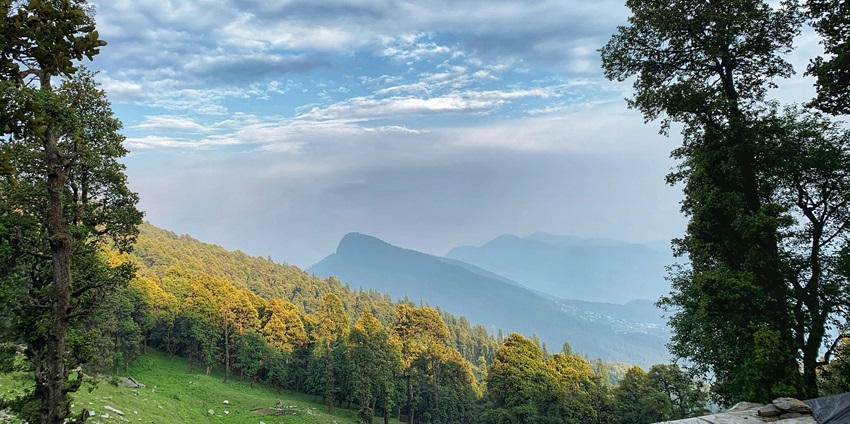
Photo: Vaibhav Goyal / Unsplash / Image For Representation Only
Manali Wildlife Sanctuary is in Nasogi, Himachal Pradesh. Located about 2 km away from Manali and has various facilities for kids. Although mainly non-native species like Poplar, Willow, and Robinia have been planted by the Forest Department to conserve the catchment area of the Manalsu Nullah, this wildlife sanctuary in Manali hosts a large variety of pheasant species.
Suggested Read: Hill Stations In Himachal Pradesh Where You Can Get Lost In The Mountains
How To Reach Manali Wildlife Sanctuary
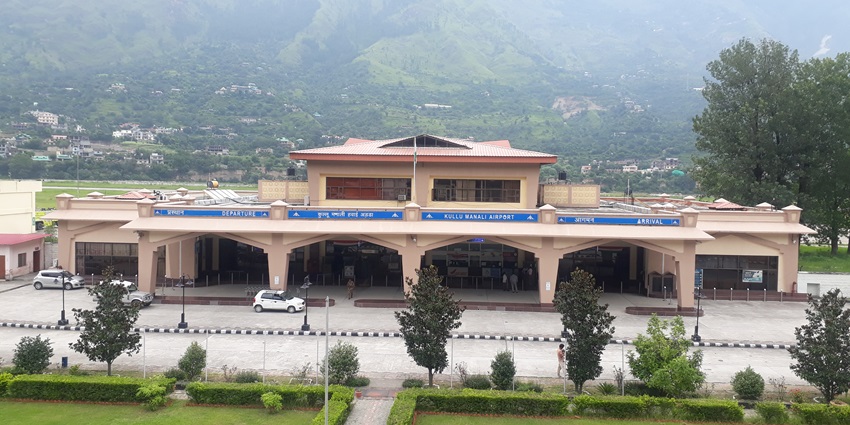
Photo: Pinakpani / Wikimedia Commons / Image For Representation Only
The Manali Wildlife Sanctuary is easily accessible by road, rail or air.
By Road: The sanctuary is located at a distance of 3.6 kilometres from Manali and 40.7 kilometres from Himachal Pradesh. Tourists can reach by car, bus, or taxi.
By Rail: The sanctuary is situated at a distance of 149.3 kilometres from Joginder Nagar Railway Station. Travellers can reach by car, taxi, or bus.
By Air:The sanctuary is nestled at a distance of 53.1 kilometres from Bhuntar Airport. Visitors can easily reach by car, taxi, or bus.
Places To Visit Around Manali Wildlife Sanctuary
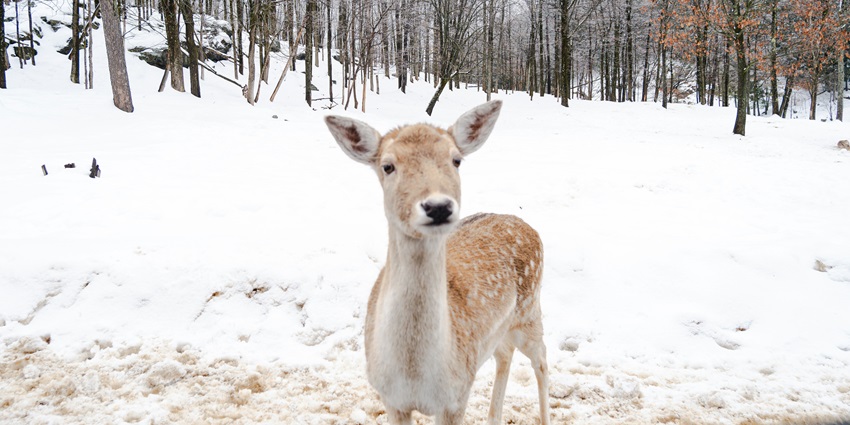
Photo: Ginabell Andujar / Unsplash / Image For Representation Only
Here are some must-go places around Manali Wildlife Sanctuary that offer breathtaking scenery and unique experiences for nature enthusiasts and adventurers alike:
1. Hadimba Devi Temple
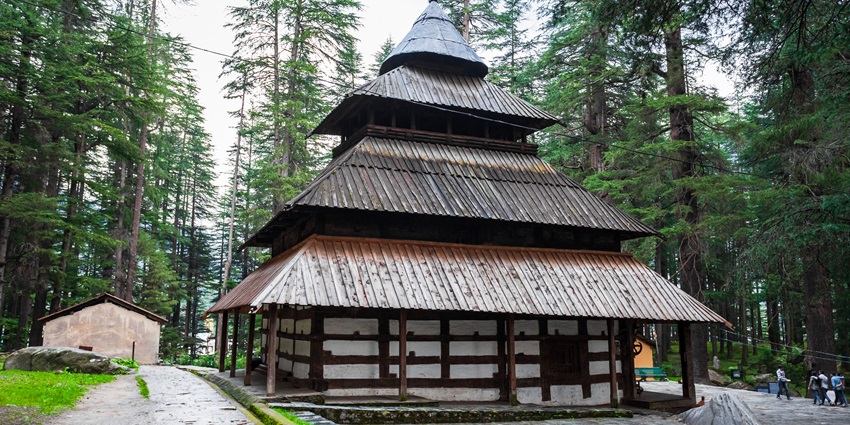
The Hidimba Devi Temple, also known as the Dhungari Temple, was founded in 1553 CE by Maharaja Bahadur Singh. This ancient Hindu cave temple in Manali, Himachal Pradesh, is dedicated to Hidimbi Devi, the wife of Bhim from the Indian epic Mahabharata. The temple is set amidst the Dhungiri Van Vihar, a cedar forest, and is built on a prominent rock revered as the place where the deity meditated.
Timings: 24*7
Entry Fees: Free
Suggested Read: Discover The Spiritual Charm Of Manali Temples In Himachal Pradesh
2. Great Himalayan National Park
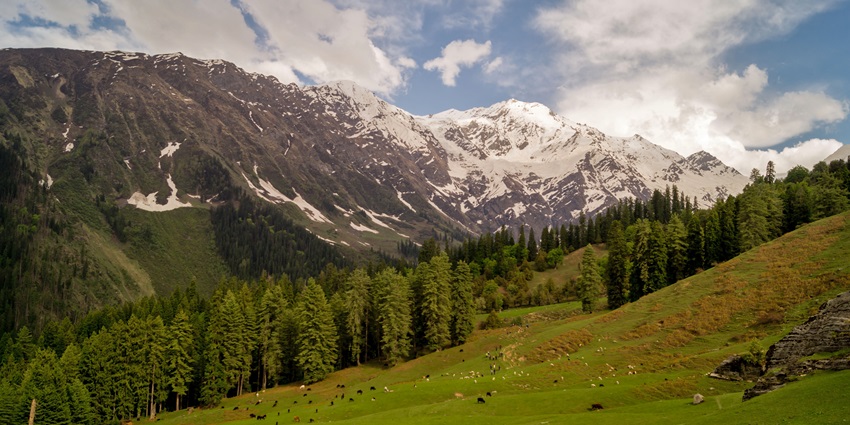
Photo: Suresh Karia / Wikimedia Commons
The Great Himalayan National Park, a UNESCO World Heritage Site in the Kullu District of India within the Banjaar Sub-Division, protects more than 31 mammal species, 209 bird species, amphibians, and reptiles. This park includes about 10% of the world’s and 50% of India’s endemic plant species. There are various treks suited for both amateurs and experts within the park. The GHNP has become a popular trekking and ecotourism destination, with permits issued by the Sai Ropa office.
Timings: 24*7
Entry Fees: ₹20
3. Rahala Waterfalls
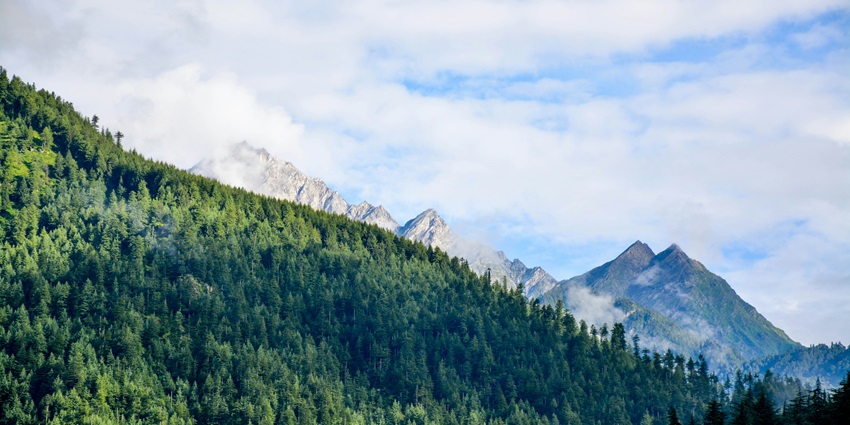
Photo: Sudarshan Bhat / Unsplash / Image For Representation Only
Rahala Waterfall is situated near the Deodar forest range in Manali, just 29 kilometres from the Manali Bus Stand. This waterfall is at an altitude of 9000 feet and is a beautiful natural spectacle. The surrounding area of the waterfall is rich in biodiversity and lush greenery, making it a serene environment for nature and wildlife lovers. The crystal clear waters cascading ever so gracefully amidst the dense forests make Ruhala Waterfalls a perfect destination for those looking to reconnect with nature and enjoy some moments of tranquillity.
Timings: 24*7
Entry Fees: Free
Suggested Read: Top Shiva Temples In Manali For Amazing Spiritual Retreat
4. Jogini Waterfall
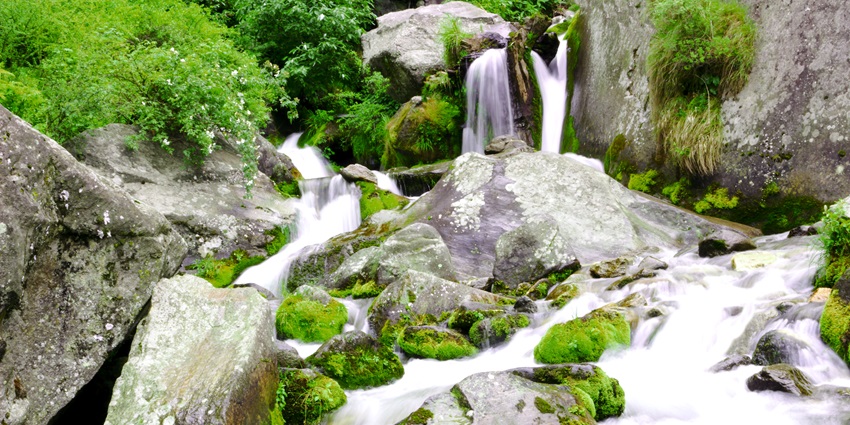
Photo: Aditya verma / Wikimedia Commons
Jogini Waterfall is a hidden spot in the middle of the forest, situated in the beautiful surroundings of Manali, Himachal Pradesh. The elevation of this waterfall is about 150 feet, offering visitors splendid spectacles, particularly in the rainy season. The surrounding area is highly endowed with diverse biodiversity, and you can also enjoy sightseeing, trekking, swimming, or even just relaxing in the peaceful surroundings.
Timings: 9 AM – 7 PM
Entry Fees: Free
5. Manali
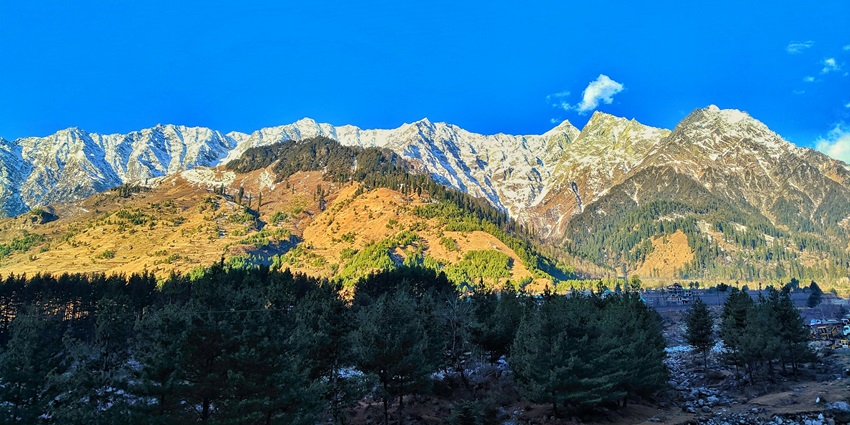
Manali, located near the end of the valley, is a popular tourist spot in Himachal Pradesh and internationally. It is known for its streams, forests, orchards, and snow-capped mountains. Manali is the starting point of an ancient trade route that connects Lahaul and Ladakh to Kashmir. It is 45 km from Kullu and has a temple dedicated to Manu, the author of Manu Samhita. The spirit of tourism in Manali remains strong, with visitors eager to explore the Himalayas during various seasons. Despite its popularity, the spirit of Manali tourism remains strong.
Things To Do: Sightseeing, Photography
Best Time To Visit: March to June
Suggested Read: Places To Visit Near Manali That You Must Visit Once In A Lifetime
Where To Stay
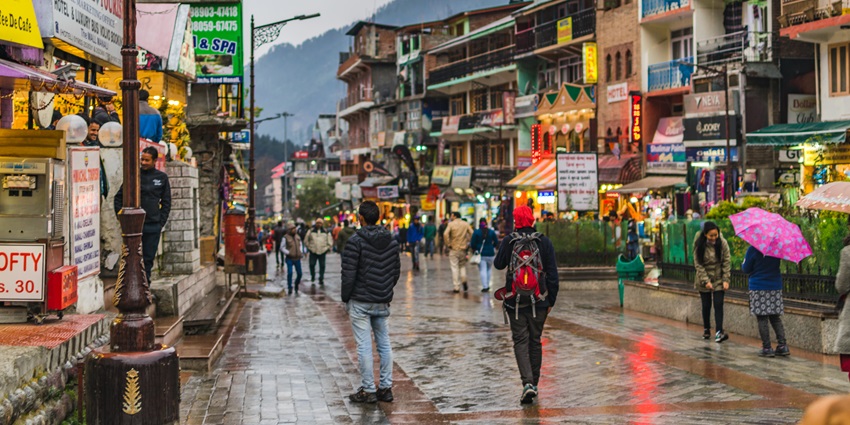
Photo: Ivishalbhutani / Wikimedia Commons / Image For Represenration Only
Visitors to Manali Wildlife Sanctuary can select from several lodging options based on their budget and preferences. Manali offers everything from inexpensive guest houses to luxury resorts, ensuring a comfortable stay for all guests. Hotels include Snow Valley Resorts, Manali Heights, Bookmark Resorts, and Nature Valley & Spa Manali-Family Resort.
One can also consider living in a local homestay for a more immersive experience that includes traditional hospitality and handmade cuisine. Each hotel option guarantees a pleasant stay, whether you prefer Manali’s bustling environment or the surrounding countryside’s serenity.
Where To Eat
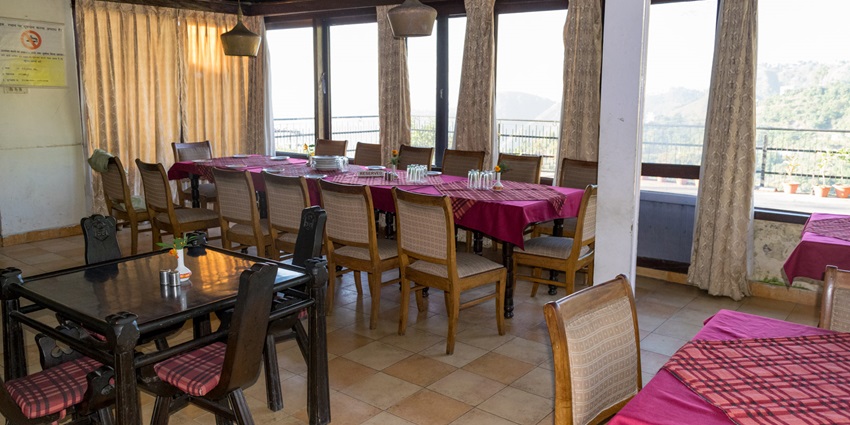
Photo: AAshish Gupta / Wikimedia Commons / Image For Representation Only
Manali serves a wide variety of cuisines, including traditional Himachali food like Aktori, Bhey, and Siddu, flavourful North Indian delicacies like biryanis and kebabs, and Tibetan specialities like thukpa (noodle soup) and momos. Local cafes and bakeries serve freshly baked food and drinks. Street food enthusiasts can sample appetisers like samosas and pakoras from various vendors. Visitors can explore restaurants like Flydining Manali, Ride Inn Cafe, Bar & Resort, and Foodie Forest Manali.
Suggested Read: Famous Temples In Mandi For A Blissful Experience
Best Time To Visit
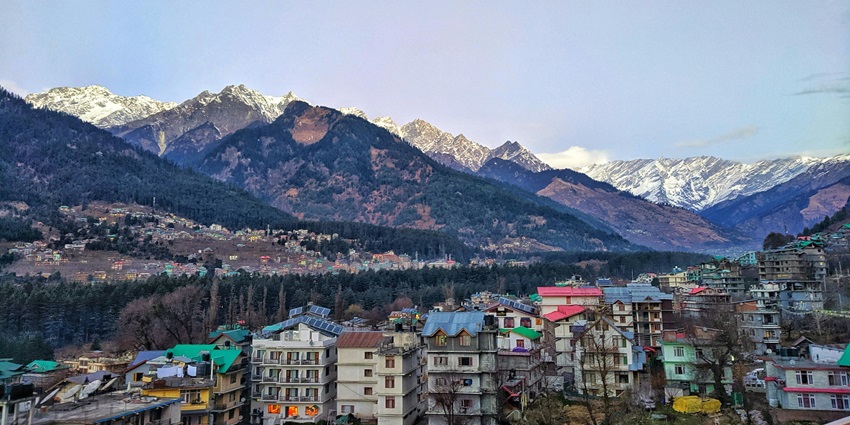
The best time to visit Manali Wildlife Sanctuary is between October to February. During these months, the weather is pleasant and perfect for outdoor activities, with cool evenings and comfortable daytime temperatures. This is also the post-monsoon season, when the natural splendour of the Himalayas reaches its height, making it ideal for wildlife viewing and nature walks. The sanctuary is less crowded during these months, which enhances the whole experience.
Other Factors To Consider
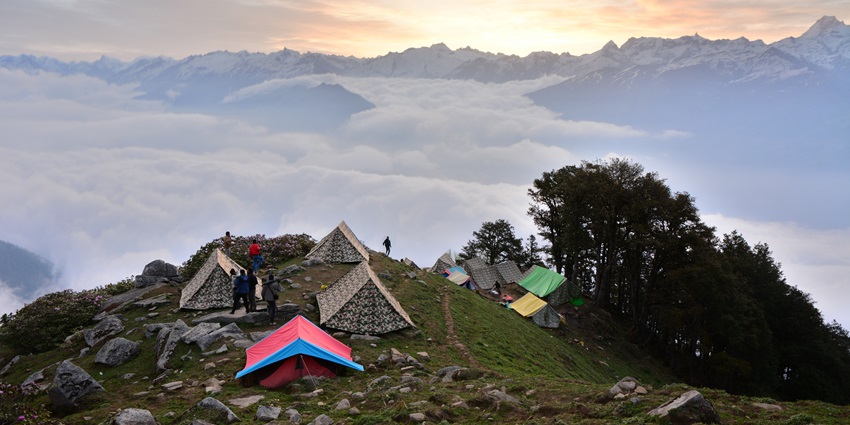
Photo: Aniket431 / Wikimedia Commons
Average Cost Of The Trip
The trip cost to Manali Wildlife Sanctuary is between INR 4000 and INR 8000 per day. This estimate includes basic lodging, meals at local restaurants, and transportation within the area. The sanctuary’s entry costs are relatively inexpensive, only Rs. 10 per person.
Tips For The Travellers
- Bring light woollen clothes since temperatures may decrease at night.
- Ensure you have all required permits for trekking or entering restricted regions.
- Practise responsible tourism by keeping safe from wildlife and adhering to sanctuary requirements.
- Support the local economy by buying items and crafts from local sellers.
- Plan your activities ahead of time and check weather forecasts to make the most of your trip.
- Do not disturb the sanctuary inhabitants while clicking photos at Manali Wildlife Sanctuary.
Suggested Read: Wildlife Sanctuaries In Himachal Pradesh To Visit On Your Upcoming Trip
Manali Wildlife Sanctuary is a haven for adventurers and nature enthusiasts, offering unparalleled beauty and rich biodiversity. Every moment spent in this sanctuary provides an opportunity to commune with nature, whether on a wildlife safari through dense forests or by the tranquil lakes. Check out TripXL for your next trip to this sanctuary for end-to-end holiday packages and a hassle-free holiday.
Cover Photo: Wild Shots By Irina / Pexels / Image For Representation Only


 WhatsApp
WhatsApp
 Twitter
Twitter









